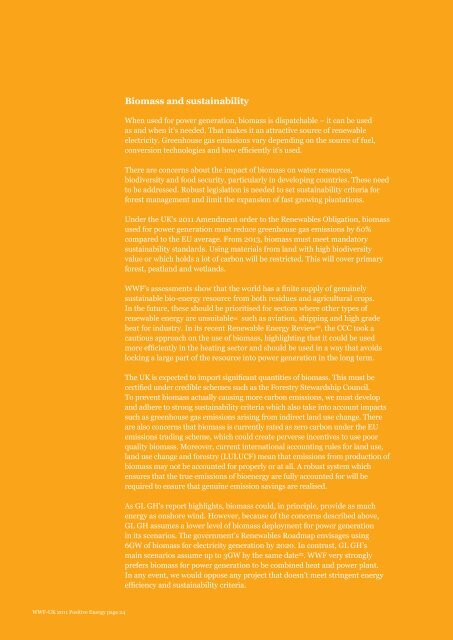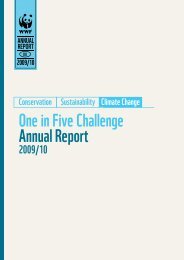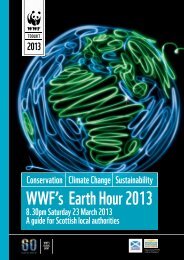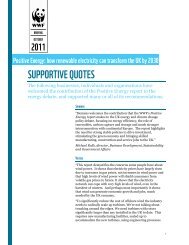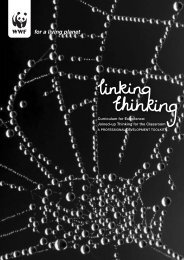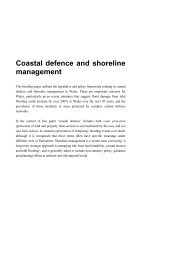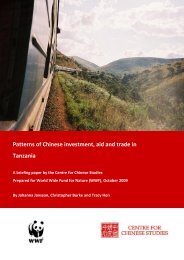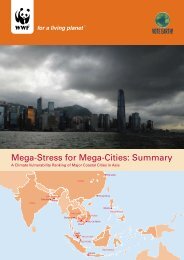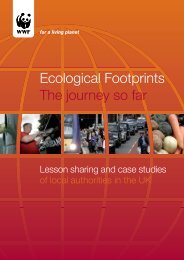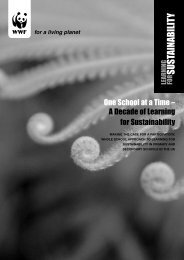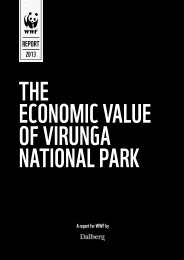Positive Energy: how renewable electricity can transform ... - WWF UK
Positive Energy: how renewable electricity can transform ... - WWF UK
Positive Energy: how renewable electricity can transform ... - WWF UK
You also want an ePaper? Increase the reach of your titles
YUMPU automatically turns print PDFs into web optimized ePapers that Google loves.
Biomass and sustainability<br />
When used for power generation, biomass is dispatchable – it <strong>can</strong> be used<br />
as and when it’s needed. That makes it an attractive source of <strong>renewable</strong><br />
<strong>electricity</strong>. Greenhouse gas emissions vary depending on the source of fuel,<br />
conversion technologies and <strong>how</strong> efficiently it’s used.<br />
There are concerns about the impact of biomass on water resources,<br />
biodiversity and food security, particularly in developing countries. These need<br />
to be addressed. Robust legislation is needed to set sustainability criteria for<br />
forest management and limit the expansion of fast growing plantations.<br />
Under the <strong>UK</strong>’s 2011 Amendment order to the Renewables Obligation, biomass<br />
used for power generation must reduce greenhouse gas emissions by 60%<br />
compared to the EU average. From 2013, biomass must meet mandatory<br />
sustainability standards. Using materials from land with high biodiversity<br />
value or which holds a lot of carbon will be restricted. This will cover primary<br />
forest, peatland and wetlands.<br />
<strong>WWF</strong>’s assessments s<strong>how</strong> that the world has a finite supply of genuinely<br />
sustainable bio-energy resource from both residues and agricultural crops.<br />
In the future, these should be prioritised for sectors where other types of<br />
<strong>renewable</strong> energy are unsuitable21 such as aviation, shipping and high grade<br />
heat for industry. In its recent Renewable <strong>Energy</strong> Review 22 , the CCC took a<br />
cautious approach on the use of biomass, highlighting that it could be used<br />
more efficiently in the heating sector and should be used in a way that avoids<br />
locking a large part of the resource into power generation in the long term.<br />
The <strong>UK</strong> is expected to import signifi<strong>can</strong>t quantities of biomass. This must be<br />
certified under credible schemes such as the Forestry Stewardship Council.<br />
To prevent biomass actually causing more carbon emissions, we must develop<br />
and adhere to strong sustainability criteria which also take into account impacts<br />
such as greenhouse gas emissions arising from indirect land use change. There<br />
are also concerns that biomass is currently rated as zero carbon under the EU<br />
emissions trading scheme, which could create perverse incentives to use poor<br />
quality biomass. Moreover, current international accounting rules for land use,<br />
land use change and forestry (LULUCF) mean that emissions from production of<br />
biomass may not be accounted for properly or at all. A robust system which<br />
ensures that the true emissions of bioenergy are fully accounted for will be<br />
required to ensure that genuine emission savings are realised.<br />
As GL GH’s report highlights, biomass could, in principle, provide as much<br />
energy as onshore wind. However, because of the concerns described above,<br />
GL GH assumes a lower level of biomass deployment for power generation<br />
in its scenarios. The government’s Renewables Roadmap envisages using<br />
6GW of biomass for <strong>electricity</strong> generation by 2020. In contrast, GL GH’s<br />
main scenarios assume up to 3GW by the same date 23 . <strong>WWF</strong> very strongly<br />
prefers biomass for power generation to be combined heat and power plant.<br />
In any event, we would oppose any project that doesn’t meet stringent energy<br />
efficiency and sustainability criteria.<br />
<strong>WWF</strong>-<strong>UK</strong> 2011 <strong>Positive</strong> <strong>Energy</strong> page 24


